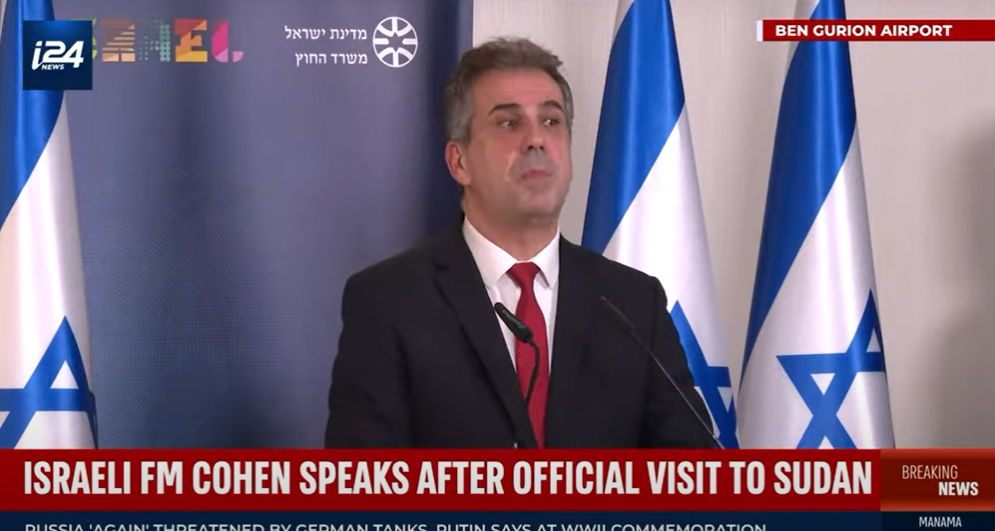The media in the Arab world are extensively dealing with reports from Israel and Sudan about considerable progress in diplomatic contacts between them for the signing of a peace agreement between the two countries.
Foreign Minister Eli Cohen made an official visit to Sudan last week and finalized the text of the agreement with the Sudanese ruler Abdel-Fattah Al-Burhan.
The signing ceremony for the agreement will be after the transfer of power in Sudan to the civilian government that will be established in the country, currently a transitional government is ruling Sudan.
So far there is no date for the transfer of power in Sudan to a civilian government, the political crisis is in full swing and there are demonstrations against the government, including demonstrations against normalization with Israel.
Political parties in Sudan expressed opposition to normalization with Israel, the People’s Conference Party and the Islamic Bloc, which includes 10 different Islamic parties, issued statements following Foreign Minister Eli Cohen’s visit to Khartoum that the military ruler Abdel Fattah al-Burhan has no mandate to conduct himself in the way he conducts himself in crucial issues without a popular mandate and extensive public support.
Foreign Minister Eli Cohen’s visit to Sudan is a blow to all opponents of normalization in the Arab world, and especially to the PA, which is constantly trying to work with Arab and Muslim countries to prevent them from signing normalization agreements with Israel.
Foreign Minister Cohen said at the end of last week:
In the event that a government is formed, they will transfer control of the country to civilian management, it is the interest of Sudan that a door be opened to Western countries, both the United States and Israel.
He added that the issue of the peace agreement can be an important tool that we have discussed in the past regarding the return of Sudanese from Israel to their country.
The Biden administration assisted Israel in talks with the ruler of Sudan to achieve political progress between the two countries and promised to help complete the process until the signing of the peace agreement.
Senior political officials in Jerusalem say that the progress in the political contacts with Sudan is very important, in view of the strategic importance of Sudan, signing a peace agreement with it will open the door to establishing relations with other countries on the African continent and strengthening the existing ties with the countries of the continent.
There is also historical significance to Foreign Minister Eli Cohen’s visit to Khartoum, the capital of Sudan, where in the past the Arab countries decided on the 3 objections as far as Israel is concerned:
No peace with Israel, no negotiations with Israel and no recognition of Israel.
Sudan joined the Abraham Accords two years ago after the United Arab Emirates, Bahrain and Morocco, but relations with it have not yet been normalized due to the political instability in the country.
Prime Minister Netanyahu is now investing a tremendous political effort behind the scenes to establish a normalization agreement with Saudi Arabia, the leader of the Sunni Muslim world, last week Chadian President Mehmet Dabi visited Israel and inaugurated the Chadian embassy in Israel with Netanyahu.
The normalization process between Israel and the Arab countries is facing great challenges and it also depends on the US relations with the Arab countries.
The Palestinians claim that the United Arab Emirates has slowed down the normalization process with Israel, Prime Minister Netanyahu’s planned visit to Abu Dhabi has been postponed pending a new announcement, and the United Arab Emirates has sided with the Palestinians in discussions at the United Nations, on the other hand, we must not forget that the United Arab Emirates recently announced the introduction of the subject of the Holocaust into its curricula .
Qatar, which does not have a normalization agreement with Israel, leads the issue of opposition to the Netanyahu government’s settlement policy and tries to influence the United Arab Emirates, Israel should take this Qatari behavior into account.
The relations between the United Arab Emirates and the Biden administration also have a lot of tension, the President of the United Arab Emirates Sheikh Mohammed bin Zayed has not yet accepted President Biden’s invitation to visit the White House because of the United Arab Emirates’ rapprochement with Russia and the United Arab Emirates’ position in relation to China.
Therefore, the rapprochement between Israel and Sudan is very important, it reflects positively on the general atmosphere in Israel’s relations with Arab countries.
Security officials in Israel note the security importance that can grow from the peace agreement between Israel and Sudan in regards to the coalition against Iran that was manifested in the establishment of the Negev Forum.
Sudan can be used as Israel’s front line against Iran, it lies along the Red Sea and the peace agreement with it will give Israel a foothold on its eastern coast, Israel will be closer to Bab Al-Mandab and Yemen from where the Houthi rebels loyal to Iran operate.
Sudan also has a border with Egypt, Libya, Chad, Ethiopia and Eritrea which can help Israel in its intelligence gathering activities.




